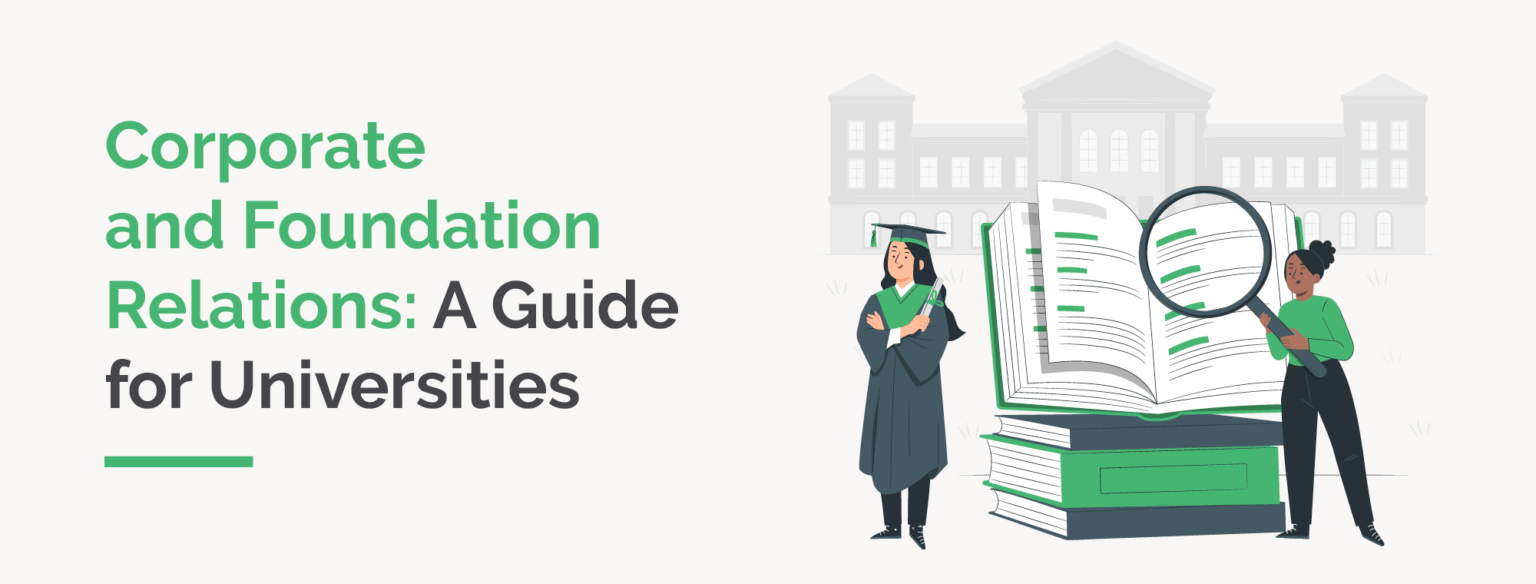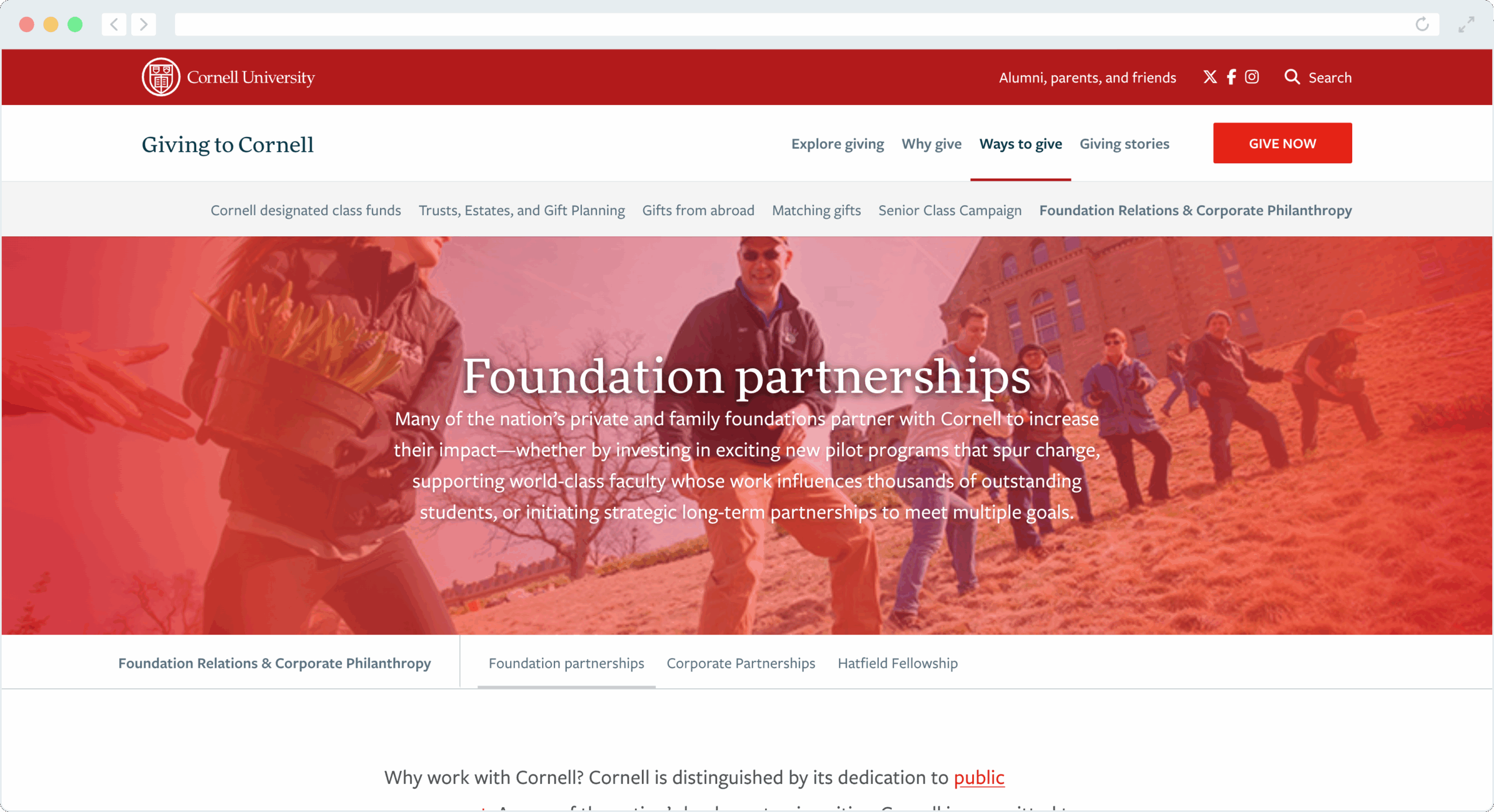Corporate and Foundation Relations: A Guide for Universities
From scholarships to research grants, universities need funding. Much university funding comes from individual donors, but corporations and foundations also play a key role in supporting higher education institutions.
Juggling relationships and grant proposals with multiple corporations and foundations for various university needs can quickly get complicated though. Not to mention, sourcing those funding opportunities can easily be a full-time job for multiple people!
This is where Corporate and Foundation Relations (CFR) offices come in. In this guide, we’ll break down what CFR is, why universities need CFR offices, and how to set their CFR office up for success.
What are corporate and foundation relations?
Many corporations and foundations offer grants that are applicable to universities. As such, universities seek out and maintain relationships with these organizations to secure funding opportunities, such as:
- Research grants. Ongoing research projects can take months or even years to produce results. To keep your students and faculty’s work going strong, they may need research grants. While individual researchers may need to apply for these grants themselves, their university can put them in touch with or at least point them toward grant opportunities they are likely to win.
- Work placements. Post-graduation plans are probably top of mind for many of your students, and universities with positive relationships with businesses can help their students get their foot in the door with their corporate partners. Along with work placements, this might take the form of yearly internships, spots at job fairs, and Q&A sessions with students.
- Partnerships. Ongoing partnerships with corporations and foundations can provide funding for your university’s major projects or long-term operations. For example, a business might agree to fund the construction and upkeep of a new football stadium and request typical sponsorship perks, such as having its logo featured on signs around the stadium, in return.
While some of these funding opportunities are awarded on a merit basis—whether on the part of an individual student, the university, or a specific department—having a positive relationship with the grantmaking organization will almost always improve the odds of receiving support.
What do Corporate and Foundation Relations Offices do?
CFR offices help keep their universities funded by finding corporations and foundations and building relationships with them. By doing so, they help students and their university as a whole by:
- Networking. When students need grant funding, only some will know where to look for these opportunities, let alone how to cultivate a relationship with the grantmakers. CFR offices work hard to establish networks of corporate and foundation partners they can then put students and faculty in contact with.
- Negotiating opportunities. Negotiating grants and financial partnerships requires special skills, and CFR offices act as the intermediary between their universities, businesses, and foundations. Along with helping students and faculty find worthwhile funding opportunities, CFR offices also talk with businesses about what their university can offer them, whether it’s talented new employees or the positive reputation boost of supporting a higher education institution.
- Securing funding. Only some foundations have work opportunities for students. Instead, they typically provide valuable grants. CFR offices help manage these grants and work with individual foundations to identify specific areas at the university or create new initiatives the grantmaking organization would want to fund.
Students and faculty can focus on research, career development, and university life while CFR offices put in the work to keep these activities funded. Corporate and foundation relationship networks don’t crop up overnight, and CFR offices keep these lines of communication open to benefit their universities and partners alike.
What tools and resources do Corporate and Foundation Relations Offices need?
With a complex web of connections to track, CFR offices employ various resources and specialized software solutions to stay organized, identify opportunities, and keep lines of communication open. Here are a few top tools and resources your university’s CFR office needs.
1. Cooperation with Other University Offices
CFR offices don’t act alone. To minimize confusion and create a cohesive experience for external partners and internal university members, CFR offices work with your university’s fundraising team, campus administrators, and faculty.
For example, a foundation may be interested in providing grant funding for research related to climate change. The CFR office would then need to reach out to various academic departments at your university to find programs and specific researchers whose work aligns with the foundation’s interests.
Or, the university’s fundraising team may secure a sponsorship with a business and then turn over communication to the CFR team that can facilitate funding for specific projects.
To encourage cooperation among university offices, ensure the heads of your university’s various offices understand what corporate and foundation relationships are and what your CFR office does. Additionally, improve your CFR office’s website to make it clear what the office’s purpose is, what opportunities they have available, and how various interested parties can get in touch with them. Here’s an example of Cornell University’s foundation partnerships page that checks all of these boxes:
2. A Reliable Network of Connections
CFR offices are valuable due to their extensive networks of corporate and foundation connections. These networks are built on mutually beneficial arrangements and trust agreements that can take years to cultivate. As such, your CFR office’s personnel are one of your university’s most important resources.
Some team members may bring in networks and relationships they’ve developed themselves, whereas others new to CFR work may still have extensive knowledge of grantmaking and corporate philanthropy.
Support your CFR office by finding new ways for them to connect and build stronger relationships with prospects. This might involve hosting events, having flexibility in what types of projects you’ll support, and investing in necessary prospect research tools.
3. Corporate and Foundation Research Tools
Many prospective corporate and foundation partners can be sourced through your CFR office’s network. However, to assess these prospects and discover new prospects, CFR offices can benefit from corporate and foundation research tools.
Specifically, two research tools you should consider investing in for your CFR office include:
- Grant research tools. Many foundations do very little, if any, promotion for their grant opportunities. To find and create relationships with these organizations, CFR offices can leverage a grant research database. Look for databases that specialize in research grants for academics.
- Corporate giving database. Some companies publicize their philanthropic activities, but tracking down the minute details can be a challenge. With corporate giving databases, CFR offices can discover companies’ giving histories to identify if they give to higher education institutions like your university.
Additionally, consider how other fundraising tools can help facilitate relationships with corporations and foundations. For example, your CFR office may help negotiate a matching gift challenge with a business wherein the business agrees to match all donations made within a certain period of time. To track this fundraiser and promote corporate matching gifts to your school’s donors even after the challenge, you may consider matching gift and workplace fundraising software.
More Resources for Universities
Corporations and foundations have the power to open doors for your university’s community. To connect with these partners, your CFR office needs support to pursue long-term, mutually beneficial relationships with funders. And your university can provide that help with the right tools, resources, and knowledge.
To expand your knowledge of the university fundraising space even further, explore these resources:
- Get on the Path to Earning Grants: 10 Grant Research Tools. Grants are a core part of relationships with corporations and foundations. Discover grant opportunities and start connecting with funders.
- Alumni Fundraising: A Complete Guide to Winning More Support. Alumni fundraising is essential for all higher education institutions. Learn how to connect with your students post-graduation in this complete guide.
- 10+ Higher Education Fundraising Conferences to Attend. The world of higher education fundraising is constantly advancing, and conferences are your go-to place for staying up to date with the latest trends. Explore these conferences and how they can help improve your fundraising expertise.







